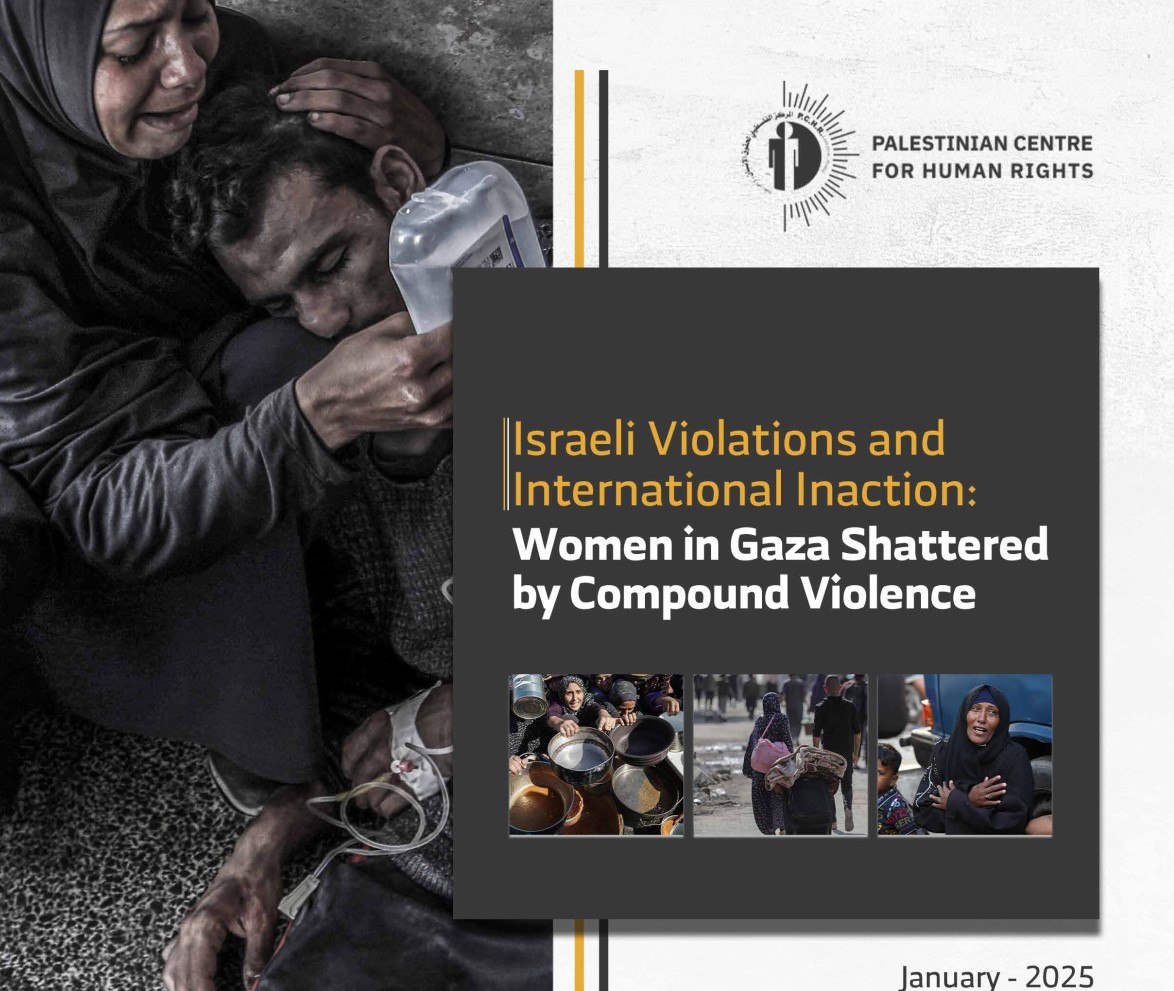
PCHR Issues Study on “Israeli Violations and International Inaction: Women in Gaza Shattered by Compound Violence”
This study is the outcome of outstanding efforts by the Women’s Unit at the Palestinian Centre for Human Rights (PCHR). Women’s Unit staff has tirelessly worked inside displacement shelters across the Gaza Strip, aiming to document the impact of Israeli occupation forces’ (IOF) violations against women during the military offensive on the Strip alongside the different forms of violence they have experienced, including physical, sexual, psychological, and economic violence.
These violations include direct physical injuries suffered by women due to the violent military aggression, as well as their struggle with the loss of a provider or close family members, such as fathers, brothers, or children. The study also emphasizes the negative effects of family fragmentation and the inhumane conditions in displacement shelters. Additionally, the study sheds light on the systematic destruction of women’s economic resources, as their businesses were halted or entirely destroyed during military aggression. The study further monitors the impact of Israel’s systematic starvation policy against the population of Gaza, including women, which has created an environment of relentless violence and compounded their humanitarian suffering.
The study has relied on different quantitative and qualitative research methods to reflect the Israeli violations and their impact on women in Gaza amid Israel’s ongoing military aggression. Three main methods have been used: 1- a survey targeting a sample of 800 women from various displacement places across the Gaza Strip using a simple random sampling from 2602 women who had participated in legal awareness sessions organized in various displacement shelters. This tool aims to collect field data on the scope of specific Israeli violations and types of violence; 2- testimonies that have documented experiences of 32 women who administrated the survey to provide a broader understanding of the nature of these violations; 3- daily field observations drawn from legal awareness sessions, which monitored the challenges faced by displaced women and the underlying causes behind them.
The study has revealed that women in the Gaza Strip have been subjected to at multiple forms of violence as 61.12% of participants have suffered from both physical and psychological violence. At least all participating women experience varying degrees of physical violence due to the Israeli-imposed starvation policy on the Strip. Moreover, the study indicates that 37.63% of women has experienced economic violence alongside physical and psychological violence due to loss of their sources of income during the ongoing military aggression. Additionally, 1.25% of the participants reported exposure to sexual violence during their detention in Israeli prisons, where women endured unimaginably dire and inhumane conditions, including strip searches, sexual harassment, and threats of sexual assault or rape. This percentage represents all the women in the study sample who had been held by Israeli occupation forces.
The study calls on the international community to assume its legal and moral obligations to hold Israeli leaders accountable, halt the systematic violations against women in Gaza by executing the International Criminal Court’s arrest warrants against Benjamin Netanyahu and Yoav Galant, and reconsider relations with Israel by suspending treaties that reinforce the Israeli occupation and apartheid. The study also calls for ensuring an inclusive and sustainable long-term plan aimed at providing urgent and long-term solutions to improve women’s psychological, health, social, and economic wellbeing and initiating an accurate database documenting the violations and at the same time ensuring confidentiality. Moreover, Additionally, the study emphasizes the importance of raising women’s awareness on available support services and facilitating their access through awareness campaigns by ensuring safe transportation and full confidentiality. These steps are crucial to ensuring that women can seek support without fear of social stigma.